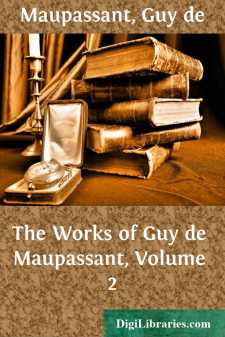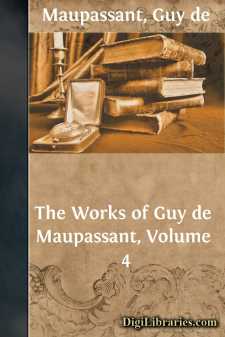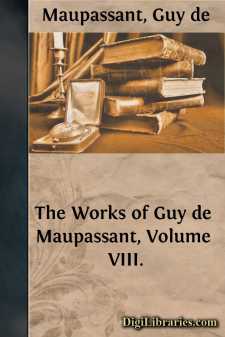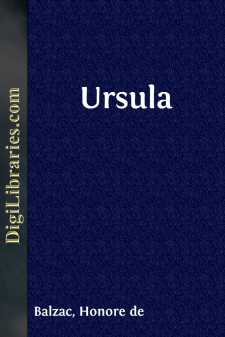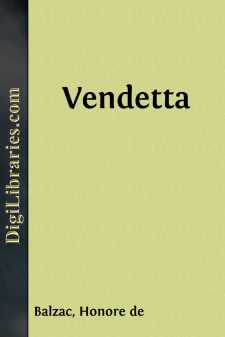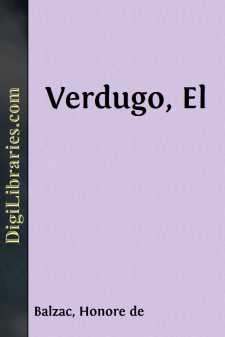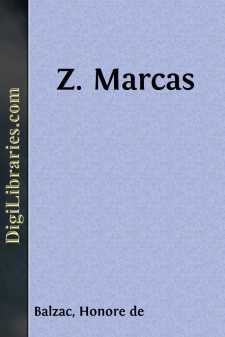Literary Collections
- American 84
- Ancient, Classical & Medieval 14
- Asian 1
- Australian & Oceanian 1
- Canadian 55
- Continental European
- English, Irish, Scottish, Welsh 179
- Essays 160
- General 24
- Letters 46
- Middle Eastern 1
Continental European Books
Sort by:
I Little George was making hills of sand in one of the walks; he took it up with both his hands, made it into a pyramid, and then put a chestnut leaf on the top, and his father, sitting on an iron chair was looking at him with concentrated and affectionate attention, and saw nobody but him in that small public garden which was full of people. All along the circular road other children were occupied in...
more...
"After all," Count d'Avorsy said, stirring his tea with the slow movements of a prelate, "what truth was there in anything that was said at Court, almost without any restraint, and did the Empress, whose beauty has been ruined by some secret grief, who will no longer see anyone and who soothes her continual mental weariness by some journeys without an object and without a rest, in...
more...
Count Eustache d'Etchegorry's solitary country house had the appearance of a poor man's home, where people do not have enough to eat every day in the week, where the bottles are more frequently filled at the pump than in the cellar, and where they wait until it is dark before lighting the candles. It was an old and sordid building; the walls were crumbling to pieces, the grated, iron...
more...
OF "THE NOVEL" do not intend in these pages to put in a plea for this little novel. On the contrary, the ideas I shall try to set forth will rather involve a criticism of the class of psychological analysis which I have undertaken in Pierre et Jean. I propose to treat of novels in general. I am not the only writer who finds himself taken to task in the same terms each time he brings out a new...
more...
by:
Gustave Flaubert
CHAPTER I THE CURSE Julian's father and mother dwelt in a castle built on the slope of a hill, in the heart of the woods. The towers at its four corners had pointed roofs covered with leaden tiles, and the foundation rested upon solid rocks, which descended abruptly to the bottom of the moat. In the courtyard, the stone flagging was as immaculate as the floor of a church. Long rain-spouts,...
more...
by:
Honore de Balzac
UNCONSCIOUS COMEDIANS Leon de Lora, our celebrated landscape painter, belongs to one of the noblest families of the Roussillon (Spanish originally) which, although distinguished for the antiquity of its race, has been doomed for a century to the proverbial poverty of hidalgos. Coming, light-footed, to Paris from the department of the Eastern Pyrenees, with the sum of eleven francs in his pocket for all...
more...
by:
Honore de Balzac
CHAPTER I. THE FRIGHTENED HEIRS Entering Nemours by the road to Paris, we cross the canal du Loing, the steep banks of which serve the double purpose of ramparts to the fields and of picturesque promenades for the inhabitants of that pretty little town. Since 1830 several houses had unfortunately been built on the farther side of the bridge. If this sort of suburb increases, the place will lose its...
more...
by:
Honore de Balzac
CHAPTER I. PROLOGUE In the year 1800, toward the close of October, a foreigner, accompanied by a woman and a little girl, was standing for a long time in front of the palace of the Tuileries, near the ruins of a house recently pulled down, at the point where in our day the wing begins which was intended to unite the chateau of Catherine de Medici with the Louvre of the Valois. The man stood there with...
more...
by:
Honore de Balzac
EL VERDUGO The clock of the little town of Menda had just struck midnight. At that moment a young French officer, leaning on the parapet of a long terrace which bordered the gardens of the chateau de Menda, seemed buried in thoughts that were deeper than comported with the light-hearted carelessness of military life; though it must be said that never were hour, scene, or night more propitious for...
more...
by:
Honore de Balzac
Z. MARCAS I never saw anybody, not even among the most remarkable men of the day, whose appearance was so striking as this man's; the study of his countenance at first gave me a feeling of great melancholy, and at last produced an almost painful impression. There was a certain harmony between the man and his name. The Z. preceding Marcas, which was seen on the addresses of his letters, and which...
more...


